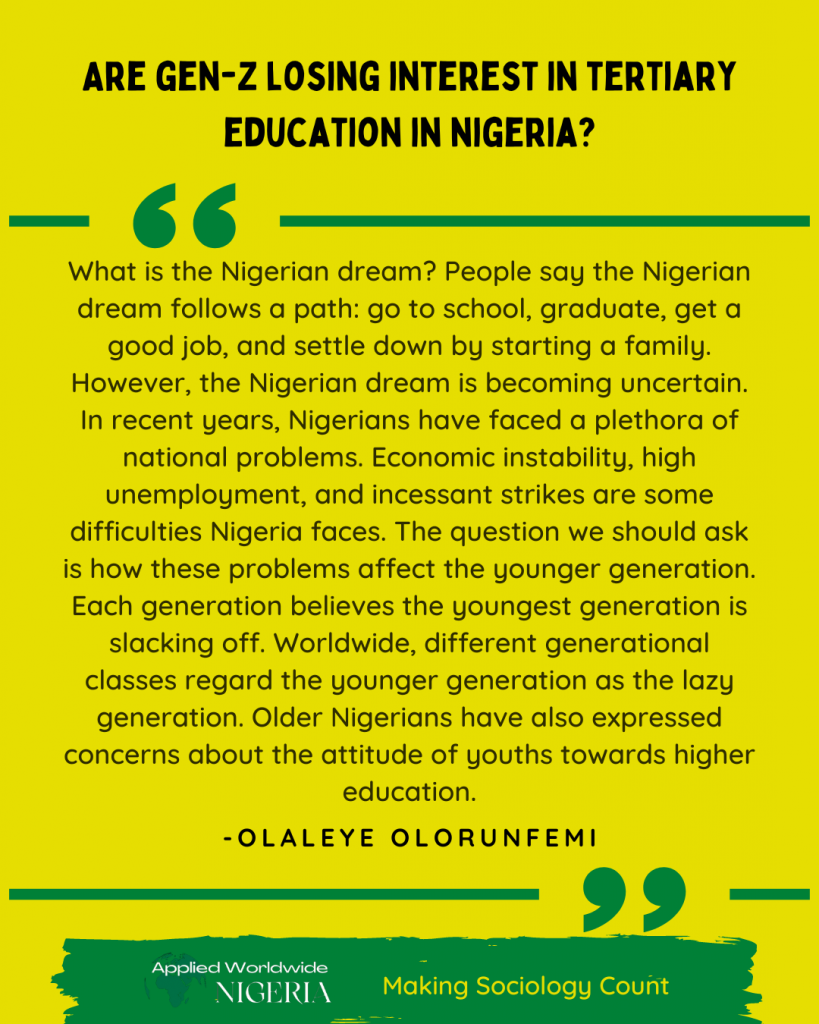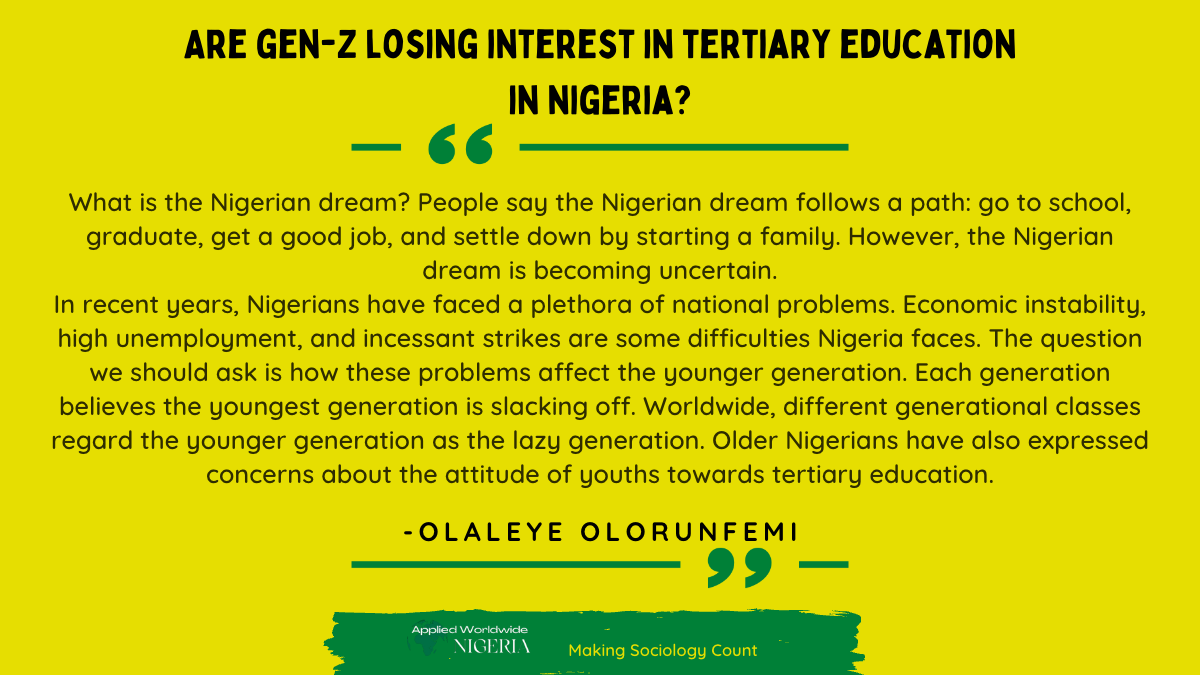What is the Nigerian dream? People say the Nigerian dream follows a path: go to school, graduate, get a good job, and settle down by starting a family. However, the Nigerian dream is becoming uncertain. Part of the reason for the uncertainty is that it seems Gen Z in Nigeria is losing interest in tertiary education.
In recent years, Nigerians have faced a plethora of national problems. Economic instability, high unemployment, and incessant strikes are some difficulties Nigeria faces. The question we should ask is how these problems affect the younger generation. Each generation believes the youngest generation is slacking off. Worldwide, different generational classes regard the younger generation as the lazy generation. Older Nigerians have also expressed concerns about the attitude of youths towards tertiary education.

If Gen Z in Nigeria cares little about tertiary education, why do they feel this way? Also, how can we change their outlook on higher education? Or is the opinion that Gen-Zs disregard school false?
A Major Problem with Tertiary Education in Nigeria
Firstly, we examine Nigeria’s educational statistics. In Nigeria, there are 20 million out-of-school children, according to data from the United Nations Educational, Scientific, and Cultural Organisation (UNESCO). This data demonstrates the severity of Nigeria’s failure to equip education to the younger generation. Nigeria has a population estimate of over 200 million people, with a median age of 18.1 years. This data shows Nigeria has a highly youthful population.
However, having 20 million out-of-school children proves Nigeria isn’t escaping the vestiges of poverty soon. A recent survey by the National Bureau of Statistics (NBS) showed 63% of persons living in Nigeria are multidimensionally poor. These reports tell the harsh reality of Nigeria’s predicament. If children aren’t receiving education, poverty will continue to thrive.
ASUU vs Tertiary Education in Nigeria
Data concerning Nigeria’s higher education also shows a similar reality. Slightly over 2.1 million students are enrolled in Nigerian tertiary institutions, whereas 39.9 million people aged 15-24 residing in Nigeria. Therefore, only one percent of the total population pursues higher education. Unfortunately, these numbers are dire for a country with a large population. Incessant strikes and the decay of public tertiary institutions.
On February 14, 2022, the Academic Staff Union of Universities (ASUU) embarked on a prolonged strike. The strike action lasted eight months before its suspension on October 13, 2022. During the eight-month ASUU Strike, students of public universities sat at home due to the shutdown of academic activities.
Scores of young Nigerians faced uncertainty over their futures during the strike action. Nearly all of them had to pick up skills to pass the time and seek employment to earn money. Moreover, admission seekers to public universities remained stuck in limbo. Some rewrote the Joint Admission Matriculation Board (JAMB) exams. Those who did eventually sought admission into private universities, but the vast majority remained. ASUU strikes in Nigeria have a deep and rich history that has soiled the educational sector. You can call it an annual pastime that represents Nigeria’s failings.
Only a few Nigerians can afford the fees of private universities. The NUC reports that private universities only make up five percent of the total enrolment rate. Nigeria’s poverty survey shows only a minority of Nigerians can afford higher education. Hence, the minority of Nigerians who can afford higher education endure recurring ASUU strikes.
Poverty and High Unemployment
Poverty is a word that seems distant to a select few, but many Nigerians know the breath of the harsh word. You don’t have to travel far distances to observe poverty in Nigeria, as its wealthiest cities house some of the poorest slums. Nigeria is facing one of its worst economic crises today, with its 2021 annual inflation rate at 16.95%. Furthermore, data from the NBS shows 133 million Nigerians living in Nigeria are multidimensionally poor.
If we examine employment, we’d also face harsh truths. Unemployment in Nigeria is at an all-time high due to 33.3% of its labor force being unemployed. Data tells the truth even when it’s bitter and cold. If a large portion of the Nigerian youth population remains unemployed and lacks higher education, will Nigeria progress?
It’s easy to be pessimistic about Nigeria’s future, but I urge everyone to find optimism. Nigerian youths can change Nigeria for good. Nonetheless, it’s lazy to believe Gen-Z cares little for education. Clearly, data shows poverty, unemployment, and incessant strikes degrade the educational sector.
Interest in Non-conventional Career Paths amongst Gen Z in Nigeria
The world is a global village due to the internet. Some people believe you don’t need a degree when you can learn almost anything on the internet. Furthermore, due to the rise in non-conventional jobs, higher education might seem unnecessary. Content creation and digital entrepreneurship are examples of atypical employment.
Nigerian zoomers are pursuing atypical career paths to earn money without a degree. It’s also safe to say that nearly all Nigerian youths in school juggle these jobs and their education. This practice comes from the Nigerian culture to be assiduous. The sentiment that younger Nigerians are lackadaisical towards education is shallow.
To verify my belief, I conducted an online survey on Gen-Z’s interest in education. The poll participants were in their first and second school years. Most participants expressed a willingness to pursue atypical jobs along with their education. Although the survey covered a small sample size, its results prove Gen-Z isn’t losing interest in education. Albeit, they’re seeking alternative avenues to develop themselves.
Final Thoughts on Whether Gen Z in Nigeria is Losing Interest in Tertiary Education
Nigeria needs to prioritize the development of its educational sector. Further strikes will only cripple higher education. Biased sentiments that regard the younger generation as lazy or only “money-driven” won’t help the country. What we need as a nation is a deliberate intervention in our educational sector.
The Nigerian dream might seem simple, but without these dreams, we’ll lose our identity and future.








